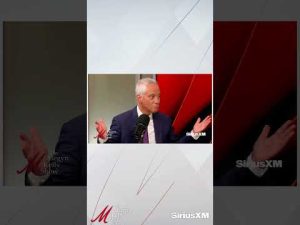In today’s news from our nation’s capital, Congress is hard at work trying to make sense – and hopefully, cents – of the daunting topics of cryptocurrency and government spending. Central to these efforts is the much-discussed Genius Act, a piece of legislation aiming to regulate the world of digital currency. Now, if the name sounds a bit self-congratulatory, well, perhaps it is. The Genius Act supposedly promises to revolutionize financial technology, much like the internet did in its day. Backed by strong leadership from President Trump, the legislation offers a framework to harness the potential of dollar-backed stable coins. After all, even if the name sounds a bit over the top, “genius” certainly catches attention, doesn’t it?
Alabama Senator Katie Britt weighed in on what this act means for everyday transactions. For those who still enjoy jingling coins in their pockets or carrying folding money, the world of cryptocurrency might sound like a distant planet. However, the push is on to ensure America’s leading role in innovation isn’t shipped offshore, especially to places like China. Fair enough—who wants cutting-edge developments springing up in countries where digital wallets are as common as chopsticks? Reinforcing America’s position at the forefront of this financial innovation serves to protect not just economic interests but national security as well.
Switching to another giant elephant in the room—government spending. As we ride the wave of reforms, there’s an ongoing effort to apply some fiscal responsibility to Congress’s notorious fondness for splashing cash. The administration aims to curtail wasteful spending, which, up until now, has been outrageously easy compared to the daunting task of cutting back. Even if slashing nine billion dollars sounds like a robust beginning, when weighed against a $37 trillion debt, well, that’s like bailing out a sinking ship with a teaspoon. Yet, it’s a hopeful start toward sustainable budgeting, a goal that bears heavily on the backs of future generations. If not tackled conscientiously, rising national debt may soon become as much a staple of American identity as fast food, rendering any mention of sustainable spending a punchline rather than a policy.
Then there’s the menace of fentanyl sweeping the nation, a tragically innovative way to empty neighborhoods instead of wallets. This epidemic preys on the young and leaves communities in despair, and President Trump is working to attack this problem head-on. With our borders more porous than a sponge, it comes as no surprise that dangerous substances have freely moved from coast to coast. The administration aims to leverage economic tools to ensure neighboring countries act as partners in this battle, because it’s difficult to have a prosperous future if it’s snuffed out before it even starts. Our northern and southern neighbors, Canada and Mexico, ostensibly must realize, too, that they can’t afford to ignore what is, in essence, a shared crisis.
And finally, in perhaps a more spirited episode of political theater, Senator Britt gave the Senate floor a glimpse of her feisty side when caught in impassioned debate with fellow Senator Chris Murphy—not that the details of this encounter are top gossip material, but it’s clear she is not one to sit quietly on the sidelines. While the conversation remains behind closed doors, her enthusiasm was palpable, and possibly as enjoyable to witness as a heated college football game, albeit with fewer cheerleaders and more pocket squares.
The excitement doesn’t stop there; with a generous portion of bravado and an extra sprinkle of genius, it seems we’re on the course to reform, revitalization, and perhaps just a touch of the predictable shenanigans from our nation’s capital. Maybe the Genius Act truly does describe all involved—or at least their aspirations.







